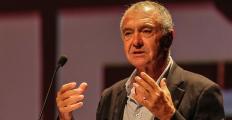#From Brain Pickings
Buddhist Economics: How to Start Prioritizing People Over Products and Creativity Over Consumption
“Work and leisure are complementary parts of the same living process and cannot be separated without destroying the joy of work and the bliss of leisure.”
BY MARIA POPOVA
 Much has been said about the difference between money and wealth and how we, as individuals, can make more of the latter, but the divergence between the two is arguably even more important on the larger scale of nations and the global economy. What does it really mean to create wealth for people — for humanity — as opposed to money for governments and corporations?
Much has been said about the difference between money and wealth and how we, as individuals, can make more of the latter, but the divergence between the two is arguably even more important on the larger scale of nations and the global economy. What does it really mean to create wealth for people — for humanity — as opposed to money for governments and corporations?
That’s precisely what the influential German-born British economist, statistician, Rhodes Scholar, and economic theorist E. F. Schumacher explores in his seminal 1973 book Small Is Beautiful: Economics as if People Mattered (public library) — a magnificent collection of essays at the intersection of economics, ethics, and environmental awareness, which earned Schumacher the prestigious Prix Européen de l’Essai Charles Veillon award and was deemed by The Times Literary Supplement one of the 100 most important books published since WWII. Sharing an ideological kinship with such influential minds as Tolstoy and Gandhi, Schumacher’s is a masterwork of intelligent counterculture, applying history’s deepest, most timeless wisdom to the most pressing issues of modern life in an effort to educate, elevate and enlighten./.../
#From:NATURE
Mapping the Universe’s dark matter
A survey of the southern sky has reconstructed how mass is spread across space and time in the biggest study of its kind. Cosmologists observed the sky between 2013 and 2019 using a 570-megapixel camera at the Víctor M. Blanco telescope at the Cerro Tololo Inter-American Observatory in Chile. The resulting 3D cosmic map provides a record of the Universe’s history. By tracking how galaxies spread out over time, researchers can measure the forces at play. These include the gravitational pull of dark matter — the invisible stuff that constitutes some 80% of the Universe’s mass — and dark energy, the mysterious force that appears to be pushing the Universe to accelerate its expansion.
‘Entire’ human genome sequence unveiled
 |
| (Christoph Burgstedt/Science Photo Library) |
An international team of scientists claims to have sequenced the entirety of the human genome, including parts that were missed in the first sequencing of the human genome 20 years ago. That historic draft, and subsequent sequences, have all missed about 8% of the genome. The most recent effort fills in these gaps using new sequencing technologies. It has different limitations, however, including the type of cell line used. The work is described in a preprint, and has not yet been peer reviewed.STAT | 6 min readReference: bioRxiv preprint |
Podcast: On the origin of numbersArchaeologists, linguists and a host of other researchers worldwide are trying to answer some big questions — when, and how, did humans learn to count? Hear from some of the scientists at the forefront of this effort on this week’s Nature Podcast. Nature Podcast | 18 min listenSubscribe to the Nature Podcast on Apple Podcasts, Google Podcasts or Spotify. | |
 | |
|
| ||||
|
Nature | 5 min read#From:
|
|
|
| PERSPECTIVE |
Marking the 40th Anniversary of the AIDS Epidemic — American Physicians Look Back R. Bayer, G.M. Oppenheimer, and V. Parisi DOI: 10.1056/NEJMp2106933 | June 2, 2021 |
C.A. Stuenkel and J.E. Manson N Engl J Med 2021;384:2073-2076 | Published Online May 29, 2021 #From: New York Review of Books #De: Jornal do Comércio Numero dedicado ao dia do Meio Ambiente #Do: Fronteiras do Pensamento |










No comments:
Post a Comment